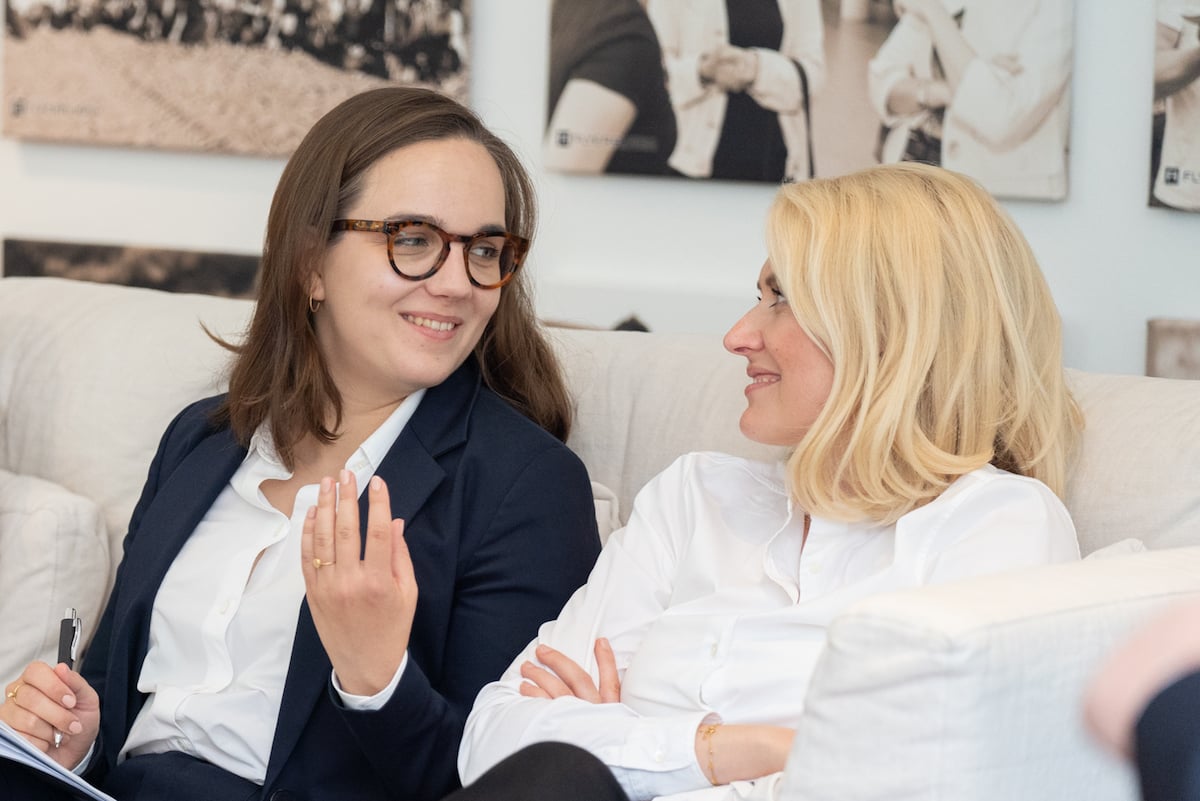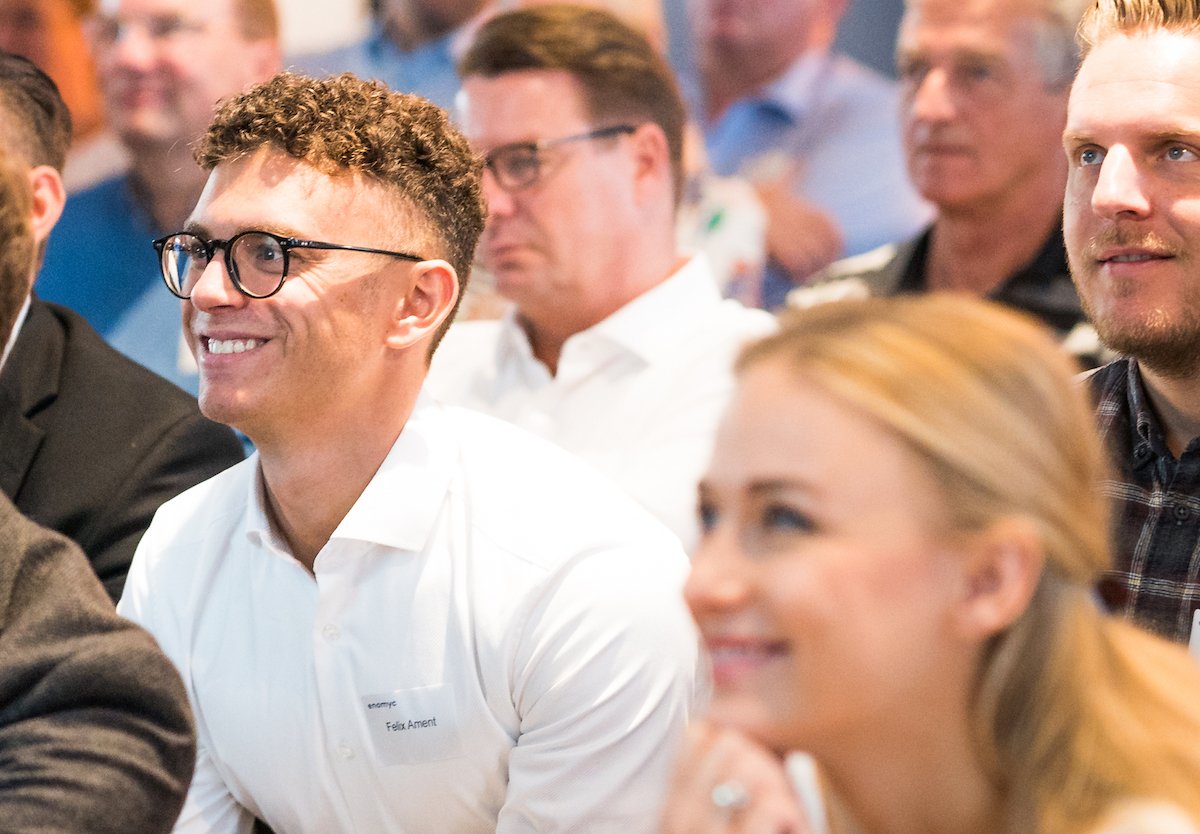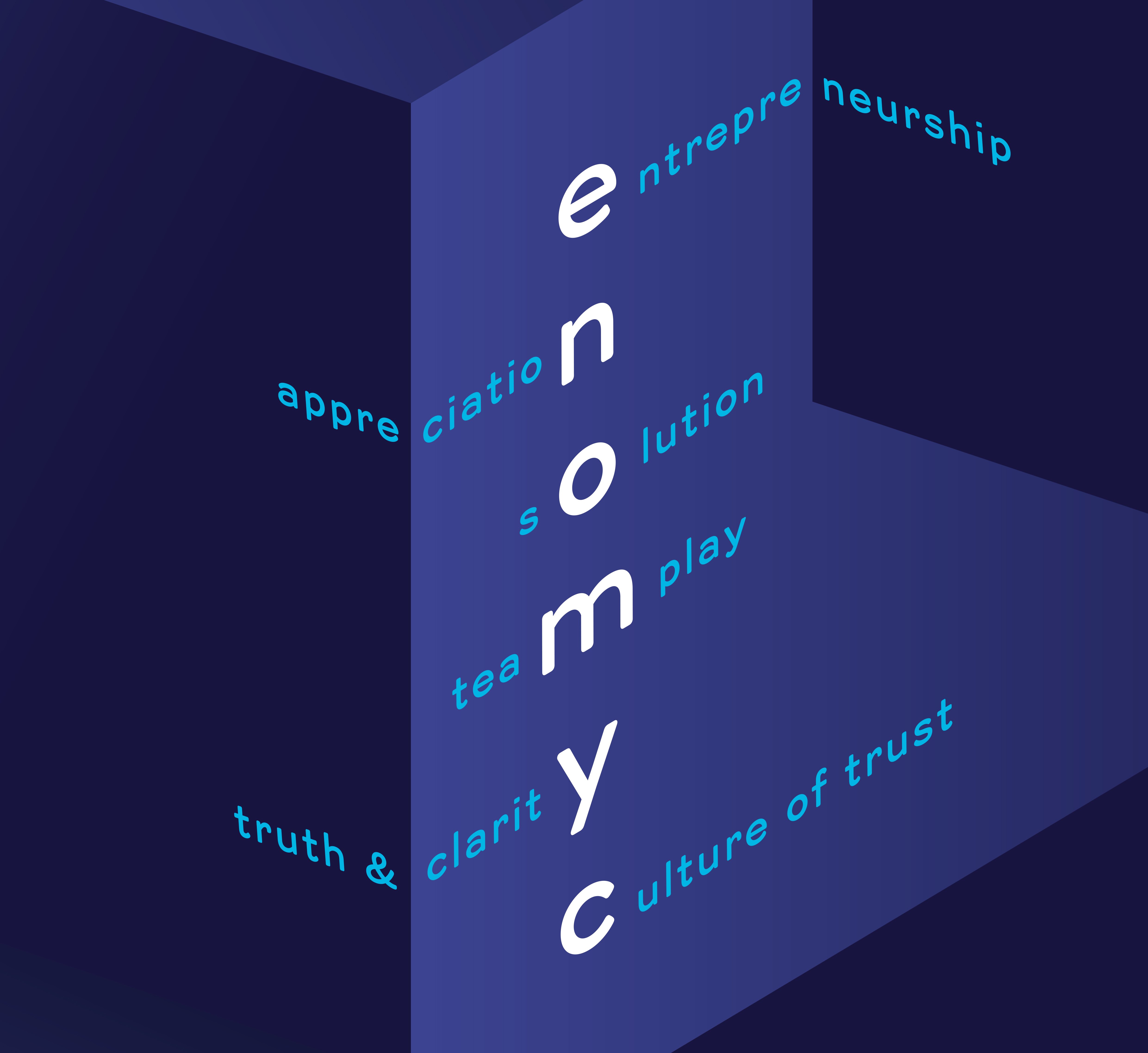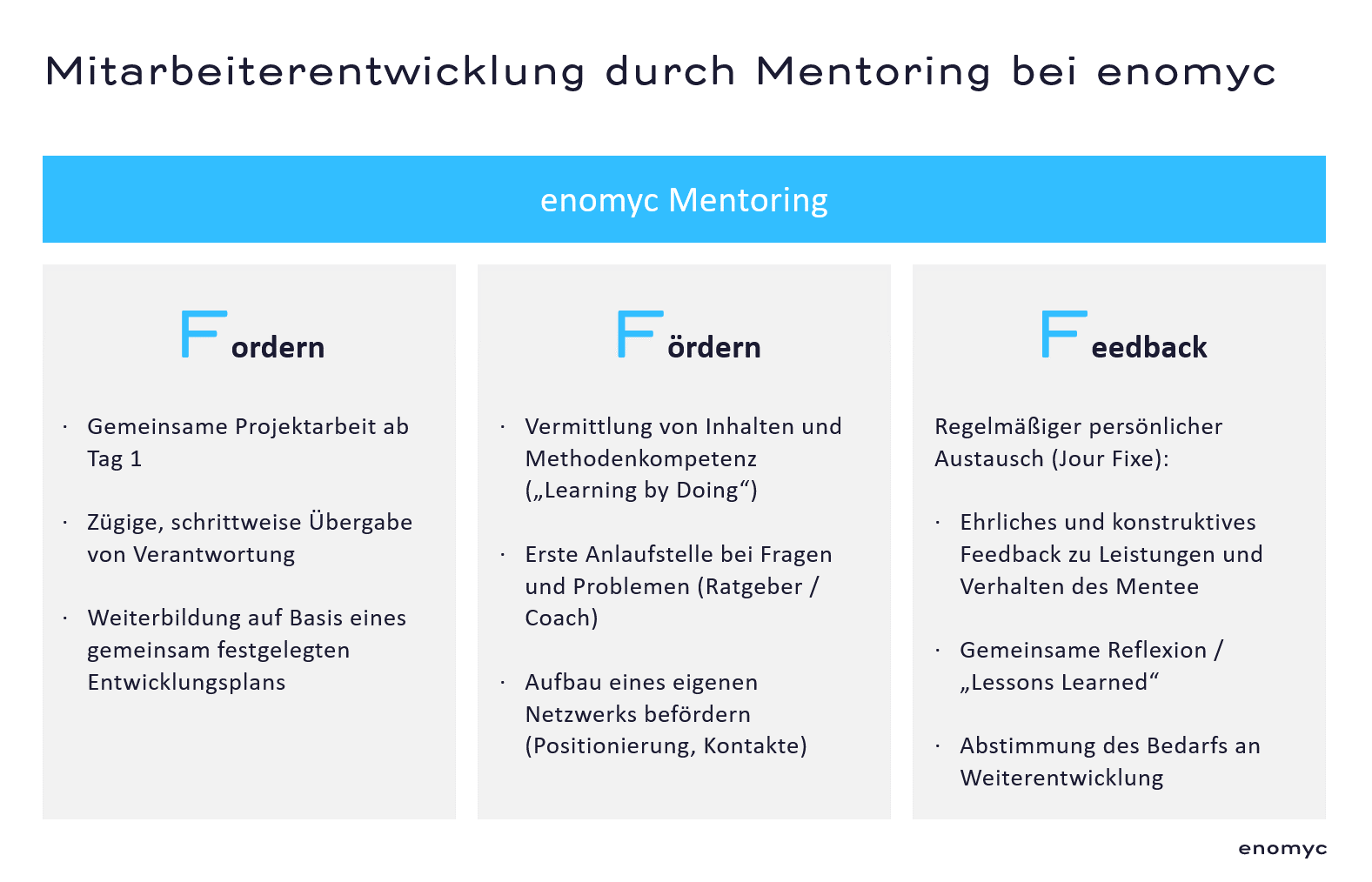Challenge, encourage, and feedback - these are the three components of our mentoring program. Dr. Axel Hermeier, Head of HR at enomyc was a mentee himself, and thinks: "Mentoring programs are a necessity". Why especially in the consulting business? How do companies and employees in general benefit from mentoring? What is the concrete situation at enomyc, and what recommendations does Dr. Hermeier have for companies wishing to introduce mentoring programs? Learn more in our interview.
Dr. Hermeier, a few years ago you were a mentee yourself. What advice from that time do you still use today?
Yes, that was at Siemens. My mentor was Janina Kugel, at that time head of human resources. There were two things I learned in particular: First, to remain true to my convictions and my own value compass - even against resistance - and thus to be authentic in my behavior and actions. Secondly, to surround myself with outstanding employees, especially in management positions, from whom I can still learn.
In your opinion, what makes for first-class mentors?
Personality counts. True interest in people: being able to listen, being empathetic, recognizing the strengths and developmental areas of mentees. Of course, they should have comprehensive technical and methodological knowledge. This is the basis for knowledge transfer - as well as strong communication skills. In addition to learning, giving advice and support, mentors should also be able to provide critical guidance to their mentees and give them "space to think". This is an important instrument in this type of leadership: first of all, just setting the framework, letting the young talents run and then talking about the procedure in the Jour Fixe.

Which strengths do mentees bring along at best?
I think understanding a partnership is crucial: it involves confidentiality, openness, commitment and reliability. In addition, there is a high willingness to learn and the ability to reflect. Mentoring works as a tandem: The contribution mentees make is very important. It is also based on their knowledge, their ability to assess and their experience.
What exactly is the psychology behind mentoring in companies?
The overall goal is the sustainable so-called "organizational socialization" of new employees. Mentors act in this system as integration help: in the best case, the new talents develop a strong bond with the company, which motivates them to fulfill their tasks with commitment and competence. In the best case, they quickly become fully integrated members of the organization who have internalized the corporate culture.
Especially young professionals often bring false expectations and uncertainty with them. At the beginning they simply lack the relevant information, but also - and not to forget - the social contacts in the new environment. At worst, this lack leads to frustration and disappointment, which makes integration very difficult. This is where mentoring comes into play in a special way: From the outset, mentees are given decisive support on the way to their new role. The transfer of knowledge takes place individually and within a relationship of trust. There are no stupid questions here. Mentees are also networked with their colleagues, which is a very important psychological factor for feeling comfortable in a new company.
 What are the definitive, sustainable effects for companies?
What are the definitive, sustainable effects for companies?
Companies generally achieve a faster integration of new talent. Mentees get to know the organization better, master their field of activity much faster, build up their personal network, become more confident and gradually take on more responsibility. In the medium to long term, companies clearly benefit from the new employees' loyalty to the company.
Do you think that management consultants are predestined for mentoring?
Not necessarily. A top consultant with many years of experience and excellent analytical skills does not necessarily have to be a good listener. But I do think mentoring should be an integral part of the company, especially in consulting. Here, due to the dynamics of the business, it is particularly important to achieve the organizational socialization mentioned above quickly. In larger organizations, there should be an option for mentoring, possibly as part of a talent development program.
Since when has mentoring been available at enomyc and what has inevitably benefited the program?
Since 2018, we have been conducting structured mentoring programs for consultants and senior consultants. One important finding has spoken in favor of the program: In order to achieve our corporate goals, we needed a dedicated investment in the integration and development of young talent. Through the mentoring program, we can ensure this. These aspects of integration have a very special significance, due to the rebranding and the transformational effect of enomyc, which has as a result, the agreed upon "Core Values" (Fig. 2). These are actively communicated and exemplified to new colleagues, especially through their mentors.
 What impact does mentoring in companies have on the millennial generation, which is placing new demands on work and employers?
What impact does mentoring in companies have on the millennial generation, which is placing new demands on work and employers?
An immense one! In the 21st Millennium, trust, fair treatment, appreciation, integrity and other core values are very important. If these values are anchored in the company and in mentoring, this has a lasting effect: a survey by Deloitte[1] showed as early as 2016 that the loyalty of Millennials to companies is positively influenced by the offer and use of mentoring: "Those intending to stay with their organization for more than five years are twice as likely to have a mentor (68 percent) than not (32 percent)," it says. As a strategic tool in the HR toolbox, mentoring has an even greater impact than usual.
Which guidelines form the basis of enomyc's mentoring program?
The three C’s of mentoring: Counselor, Consultant and Cheerleader (Fig. 2). Our young talents accompany their mentor from day 1 on to projects and to customers. Mentees gradually take on more responsibility under guidance. The jointly defined development plan forms the binding framework for this. We support our mentees individually. The transfer of methodological competence and experience is based on the principle of "learning by doing". The mentors are always available to answer questions, give both professional and personal advice and open doors to building up our own network - internally and with all relevant stakeholders. They also provide regular honest feedback. Feedback creates the necessary transparency about the individual's level of development and enables continuous learning in the sense of "lessons learned".

What criteria are used by enomyc to assemble teams of mentees and mentors?
On the one hand, we are guided by the organizational structure, which on the consultant side is structured according to the typical corporate functions - Finance, Operations or Sales & Marketing. New talents are assigned experienced mentors from the respective functional team. On the other hand, we pay attention to the individual professional background, which in turn determines the need for training and further education. We also put the teams together with regard to the chemistry between mentor:in and mentee. That should be right!
What is the feedback from mentees so far?
Consistently positive. The mentees emphasize the personal exchange with the experienced colleagues, that they show honest interest in their further development, serve as role models and advisors and explain the "hidden rules" of the company and consulting business. And, of course, as a mentor you also benefit very concretely from the interaction with the young talents: Their perspectives and skills are an enrichment for the whole company.
What is the future of mentoring at enomyc?
Now that we have established mentoring as a standard for the onboarding of new colleagues, it is now a matter of further optimizing the concept through continuous organizational learning. What lessons have you learned from the mentoring program at enomyc? Consulting business is a "people business": The quality of our services depends on our consulting personalities and their skills. The feedback we have received so far and the demonstrably positive effect on the development of young talents has enormously increased the appreciation within the company for the investment in the mentoring program. In my opinion, the result speaks for itself.
What recommendations do you have for companies that now want to develop a mentoring program?
Although it is important to have a mature mentoring concept at the end of the project to communicate the objectives, general conditions and expectations of the colleagues involved, it is also important to have a clear understanding of the role of the mentor. I consider it even more important to gain initial experience as quickly as possible through a "test case": In fact, only a concrete mentoring relationship provides important insights into what works and what doesn't work in the company. These early insights should definitely shape the final mentoring concept.
Thank you very much for the interview, Dr. Hermeier.
[1] The 2016 Deloitte Millennial Survey. Winning over the next generation of leaders.


